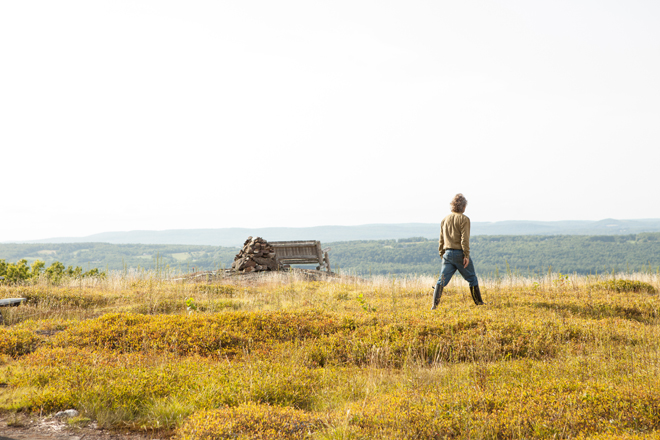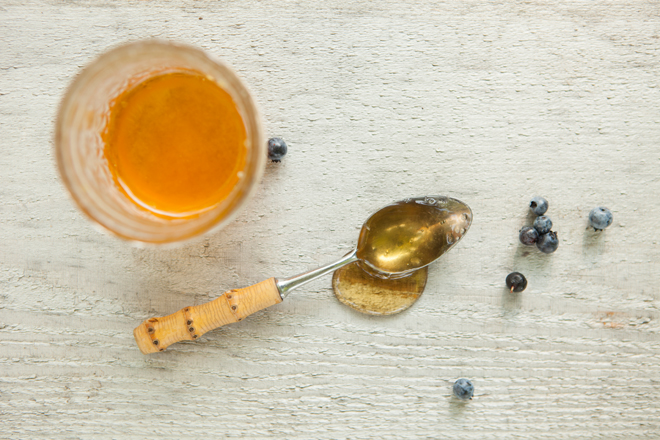Scott Horty
The Buzz about Bees & Blueberries
“People take for granted how we get our food. Pollination is a fascinating aspect of the process,” says Scott Horty. “My wife has huge gardens, and we saw an increased bounty of flowers and increased fruit production when we began using bees.”
Horty moved to Maine from Minnesota in 1981. Like many devoted transplants, 60-year-old Horty fell in love with the Pine Tree State after vacationing here. He went on to become an avid promoter of Maine’s considerable attributes as the owner of Camden Real Estate.
Fifteen years ago, Horty and his wife, Robin, bought Home Place Farm in Hope. Ten years ago, they acquired 25 acres of convention- ally grown blueberry fields that abutted the farm. After some deliberation, they decided to make the transition to organic blueberries. “For a long time, everything has been focused on big agriculture,” says Horty. “With big agriculture, we used pesticides for years and years. In Maine we are focused on small agriculture. People are buying their blueberries just down the block. Many of us have gone organic because we believe it is better for the environment and better for our food.”
As part of the blueberry cultivation process, Horty continued to use honeybees to pollinate the blueberry fields. Pollination, says Gold Star Honeybee owner Christy Hemenway, is an easily understood concept: “Bees are how plants have sex.” She continues, “Plants can’t walk around or meet and greet each other, so the bees do that for them. A bee gets on a plant and bumps up against the pollen, and then gets on another plant of the same type and bumps up against the plant’s reproductive organ. That’s how we get more plants.”
Our food supply depends upon the well- being of pollinators such as honeybees. A “canary in the coal mine,” the health of this industrious insect can be a harbinger of bigger issues at play within the environment. In 2006, beekeepers began noticing a phenomenon that eventually became known as “Colony Collapse Disorder.” Dave Hackenberg, a large commercial beekeeper from Pennsylvania, had 400 thriving hives resting in a Florida beeyard. Between one visit and the next, two weeks later, things had changed dramatically. The majority of his bees had disappeared. This scenario was repeated in hives across North America.
“Colony Collapse Disorder leaves you with a hive that is not full of dead bees; it’s simply empty,” says Hemenway. “That’s extreme.” Hemenway, author of The Thinking Bee- keeper, explains that bees are very protective of their baby bees, also called their brood. They are also protective of their honey, which is their food source. Honeybees only sting as a means of safeguarding their “brood and food,” says Hemenway. Once a honeybee has stung, it dies. They are fierce defenders of their hives. “For the bees to fly off and leave behind their brood and food is really strange.”
Bee researchers have yet to understand what causes Colony Collapse Disorder (CCD). Various theories exist, including infection, genetic susceptibility, malnutrition, and exposure to pesticides. Most believe that CCD is due to a combination of the above. Hemenway references a famous quote by John Muir: “When we try to pick out anything by itself, we find it hitched to everything else in the universe.”
“Nothing will bring that point home to you like being a beekeeper,” continues Hemen- way. “Using the pesticides and toxic stuff on the food that we eat, we’re affecting the bees. Anything that goes into the air, soil, or water affects us all.”
“It’s all connected,” Horty agrees. The child of an artist and an architect, and a longtime renovator of homes, he knew that a good product was the result of careful design and the use of high-quality materials. He translated this into the care of his blueberry crops, which he does with the help of field manager Cary Nash.
Every other spring, Nash rents 50–60 hives from local beekeepers (when possible) like Sparky’s Apiaries in Hope. An individual hive will contain 60–80,000 bees. The rented hives are placed strategically across the blueberry fields, and the bees, which can fly up to five miles away from their hives, enjoy a progression of blossoming vegetation as the weeks pass. The bees move from cherry, apple, and birch trees to the all-important blueberry bushes. As the meandering bees touch down on each bush, the plants are pollinated, which allows the blueberries to fruit and grow.
By mid-June, it is clover season, and blue- berry pollination has slowed. The rented hives are removed, and the honey harvested by the apiary. Meanwhile, Horty monitors the hive that he keeps for personal use on his farm. This hive can yield 30–70 pounds of honey yearly. Horty leaves enough honey so that the bees are nourished and able to “overwinter” on the food they have created for themselves. During cold weather, he wraps the hive and leaves it in a south-facing location, out of the wind.
By March or April of the following spring, Horty repletes the bees’ food source with a homemade solution of sugar syrup. When the weather warms up, he opens the hive again, to determine whether the bees have survived. Most bee colonies last three or four years. Last winter, due to the extreme cold and significant variation in temperatures, the bees did not make it. He bought a new box of bees, called a nuke, from Swan’s Honey in Albion. Each nuke contains one queen, who lays the eggs that become the male drones and female worker bees. The drones are responsible for mating with the queen; the workers make the honey.
Horty values the honey that his bees produce. “[Making] your own honey is so much better,” says Horty. “Something about it tastes fresher.” Horty has also experienced therapeutic benefits from his honey. As a family doctor and acupuncture practitioner, I often suggest that my adult patients ingest local honey to decrease seasonal allergy symptoms. Although research is still inconclusive, some healers theorize that honey contains minute amounts of pollen, which acts similarly to allergy shots in boosting the immune system, preventing congestion and itchy eyes.
A sufferer of grass and pollen allergies, Horty has found that his allergic symptoms are improved by a daily serving of honey from his bees. He purchases honey made by Puerto Rican bees when he travels to his second home in Vieques. “It really does help,” he says.
Bee stings, and beehive products such as propolis, royal jelly, and bee pollen, are also thought to be helpful for stimulating the immune system. Called apitherapy, this alternative approach is used for management of pain and chronic conditions, such as multiple sclerosis. Dr. Theo Cherbuliez is a practicing psychiatrist and past president of the American Apitherapy Society, who offers bee sting therapy in South Freeport. Accord- ing to Dr. Cherbuliez, traditional apitherapy, which uses bee stings rather than modified bee products, has been in existence for 2,000 years.
“Products made by live bees have very interesting qualities,” says 87-year-old Cherbuliez. “You cannot know the composition of the product, and if you cannot know the composition of the product, germs can’t know it either.” Exposure to these ever- changing substances enables the immune system to stay nimble, and react more effectively to things that might be causing inflammation in the body.
Horty has never tried bee stings as a treatment for inflammation. He does have respect for the stings themselves, however, and typically uses protective headgear when managing his bees. An experience earlier this summer solidified the importance of this practice. The weeks before his rented hives were to be removed had been more balmy than usual, and the hives were overfull. Some of the bees were left behind and made nests on the ground. While clear- ing a field, he mowed over the nests. He estimates that he was stung 20 times on the left side of his face, resulting in a black eye and significantly swollen cheek.
Despite this, Horty remains a fan of bees and their effect on his blueberries. Four years ago, as one of the top producers of organic blueberries in the state, he and Robin harvested 30,000 pounds of berries from his fields. This year they hope for an equal harvest. Most of these will be sold to Merrill Blueberry Farms in Ellsworth, where 90 percent of the blueberries are flash frozen before they are distributed. Horty tells me that he has eaten his own frozen blueberries after several years have passed, and found them remarkably fresh and tasty.
Delectable blueberries and allergy-healing honey are not the only byproducts of Horty’s relationship with bees. Continuing the discussion regarding food supply has become equally important. “My wife and I are growing organic because we think it is the right thing to do,” says Horty. “By growing organic and talking to other people about the experience, some have decided that they should stop spraying pesticides, too.”
Like the bees, we would do well to remember that we are part of a larger whole, and that we are hitched to everything else in the universe. “If you do good, and somebody else does good,” suggests Horty, “then it becomes cumulative good.” It’s all about pollination—whether of ideas or blueberry plants—and a fascinating process it is.































